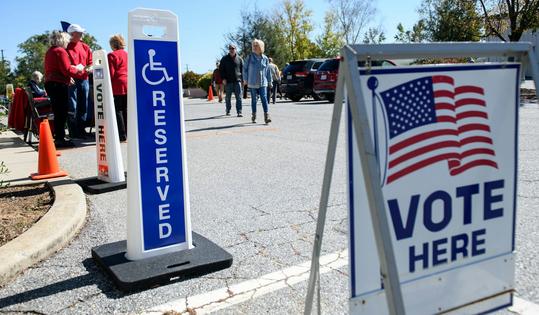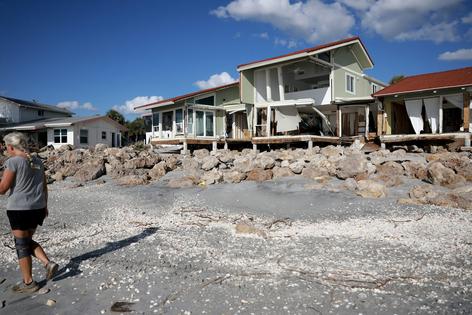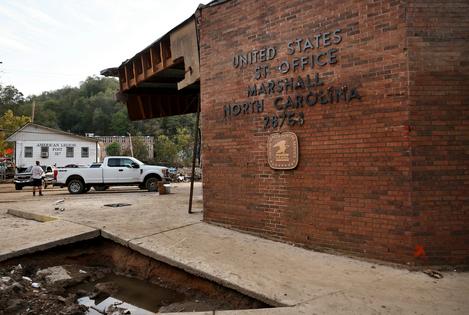Florida and North Carolina are making it easier for people to vote after the hurricanes – but some risks remain
Published in News & Features
Polls opened in North Carolina on Oct. 17, 2024, as about 14,000 people in Asheville and surrounding areas remain without power in their homes following Hurricane Helene. In Florida, which started early voting in some counties on Oct. 21, about 400,000 residents are still without power after Hurricane Milton.
Some experts have said that the hurricanes could cause voter numbers to drop – and impacts of Helene have already prompted a few early polling stations in western North Carolina to close. But more North Carolina residents turned out to vote on the first day of early voting than they did in 2020.
Amy Lieberman, a politics and society editor at The Conversation U.S., spoke with Michael T. Morley, who studies natural disasters and election law, to understand how these recent storms could complicate voting in the presidential election.
A hurricane or natural disaster makes an election tremendously more challenging for both election officials and voters on various practical levels.
Election administrators might have been injured, or their homes could be flooded or destroyed. State officials need to ensure, especially in areas that have been hardest hit, that enough local administrators remain in place to continue distributing absentee ballots and to staff early voting locations.
Still, I have not seen empirical evidence that the results of any federal elections in recent decades have changed as a result of hurricanes.
Florida has one of the most comprehensive laws to deal with election emergencies of this sort because it faces them frequently.
Florida Gov. Ron DeSantis signed an executive order on Oct. 3, 2024, in response to Hurricane Helene. Among other things, Florida law says that in a state of emergency the governor can suspend state statutes or regulations governing state business when complying with them can interfere with disaster response.
Florida, like other states, has deadlines for when election officials must designate polling locations. DeSantis waived this deadline to authorize county officials to designate new ones. DeSantis’ order also gives election officials more discretion about where new polling locations may be located. And he made it easier for state employees to step in and serve as poll workers, particularly on Election Day.
DeSantis suspended a state requirement so a person who cannot return to their home can ask by phone to have a vote-by-mail ballot sent to wherever they are staying – not just their registered home address. Making it easier for ballots to be sent to people, wherever they are, is one of the most effective measures that Florida has implemented to help make voting easier.
In North Carolina, meanwhile, state officials have authorized different changes that will apply to the 25 counties in the western part of the state that are under emergency orders because of the hurricane. These changes are mostly focused on voting by mail and polling place workers. They also allow county boards of elections to change Election Day voting locations and permit voters to drop off absentee ballots at any county board of election office by 7:30 p.m. on Election Day.
Western North Carolina voters now also have until Nov. 4 to request a mail-in ballot, as opposed to the original deadline of Oct. 29.
Overall, North Carolina Gov. Roy Cooper authorized US$5 million for the state’s board of elections in order to make it easier for western North Carolina residents to vote.
Disputes have already arisen about potential extension of the voter registration deadlines in states affected by Hurricanes Helene and Milton. Courts in Florida and Georgia have already declined emergency motions to extend the voter registration deadline.
A South Carolina state court, in contrast, held in October that the deadline had to be extended for 10 additional days.
Similar disputes are likely to arise over such election rules as photo identification requirements at polling places and the deadlines for requesting and returning absentee ballots.
Occasionally, challenges also arise alleging that certain measures to address an emergency have gone too far.
During the height of the pandemic, for example, the Trump presidential campaign filed lawsuits that unsuccessfully challenged state decisions to automatically mail absentee ballots to people registered to vote.
My biggest concern is that, particularly if the election is close, a losing candidate might attempt to use the hurricane as a way of trying to challenge the election results or call them into question.
Courts will almost certainly reject that. Once the election has happened, a court generally will not set aside the results or order additional voting, even if voters faced substantial burdens and people think there is more that election officials could have done. This is especially true in the context of a presidential election, since the U.S. Constitution and federal law establish several important postelection deadlines involving the Electoral College.
Some people already have unwarranted skepticism about the electoral process. It would be bad for our democracy if the recent hurricanes are exploited as a basis for refusing to accept the election’s results.
This article is republished from The Conversation, a nonprofit, independent news organization bringing you facts and trustworthy analysis to help you make sense of our complex world. It was written by: Michael T. Morley, Florida State University
Read more:
A devastating hurricane doesn’t dramatically change how people vote – but in a close election, it can matter
Hemingway, after the hurricane
People displaced by hurricanes face anxiety and a long road to recovery, US census surveys show − smarter, targeted policies could help
Michael T. Morley is Sheila M. McDevitt Professor of Law at FSU College of Law. He serves as Faculty Director of the FSU Center for Election Law established by the Florida State Legislature and Vice Chair of the Florida Advisory Committee to the U.S. Commission for Civil Rights. He is a member of the National Task Force on Election Crises and Election Officials Legal Defense Network.













Comments